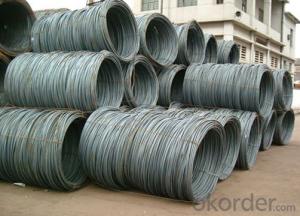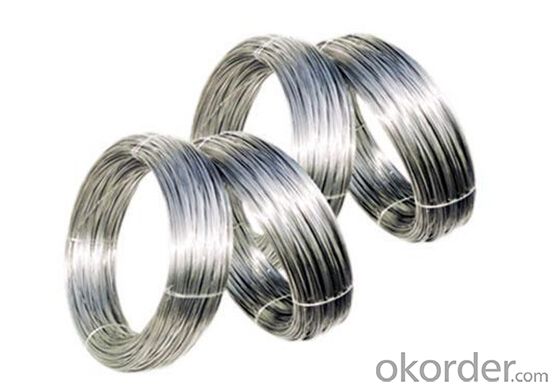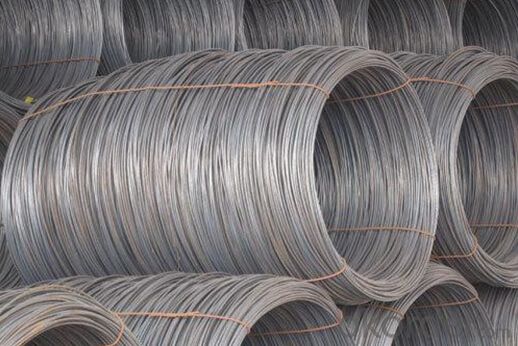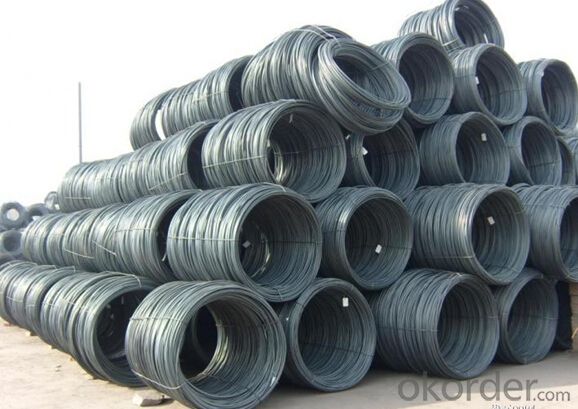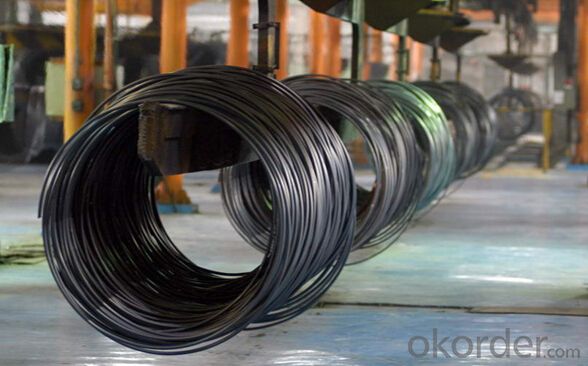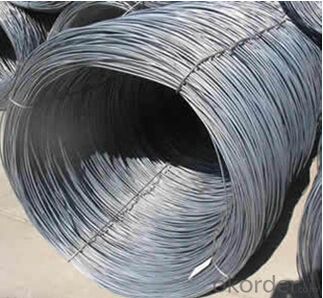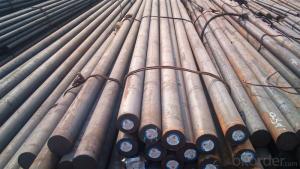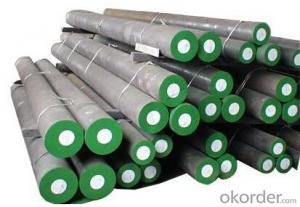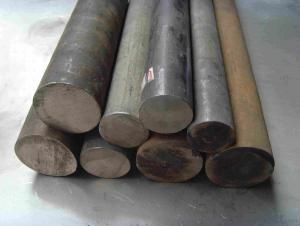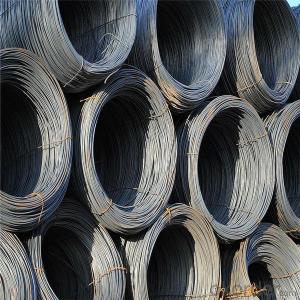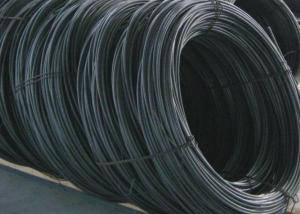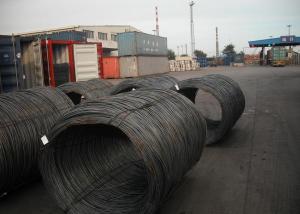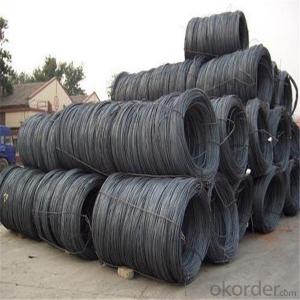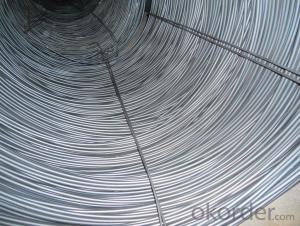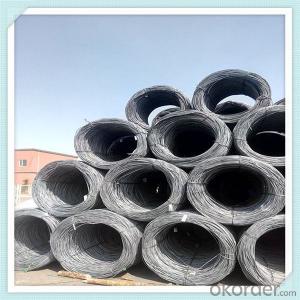Hot Rolled High Carbon Wire Rod With Different Material Grades
- Loading Port:
- Tianjin
- Payment Terms:
- TT OR LC
- Min Order Qty:
- 3 m.t.
- Supply Capability:
- 10000 m.t./month
OKorder Service Pledge
Quality Product, Order Online Tracking, Timely Delivery
OKorder Financial Service
Credit Rating, Credit Services, Credit Purchasing
You Might Also Like
Specification
Type:
Carbon Steel,Spring Steel,Bearing Steel,Gear Steel,Deformed Steel,Stainless Steel,Alloy Steel
Shape:
Steel Coil,Steel Sheet,Steel Wire Rod,Steel Flat Bar,Steel Square Bar,Steel Angle,Steel Round Bar,Steel Billets
Technique:
Hot Rolled,Cold Rolled,Cold Drawn,ERW,Forged,Saw,Extruded,EFW,Spring
Surface Treatment:
Galvanized,Coated,Copper Coated,Color Coated,Oiled,Dry,Chromed Passivation,Polished,Bright,Black,PVDF Coated
Certification:
ISO,SGS,BV,IBR,RoHS,CE,API,BSI,UL
Thickness:
5.5-20mm
Width:
5.5-20mm
Length:
coil
Outer Diameter:
5.5-20mm
Net Weight:
2m.t.
Packaging:
Seaworthy packaging
Hot Rolled High Carbon Wire Rod With Different Material Grades
Detailed Information of the Hot Rolled High Carbon Wire Rod
| Name | Hot Rolled High Carbon Wire Rod |
| Shape | Round Bar/Square Bar/Flat Bar/Plate/Wire |
| Standard | GB/ASTM/SAE/AISI/DIN/JIS/EN/BS |
| Surface Treatment: | Black/Peeling/Polished/Machined |
| Delivery Condition: | Hot Rolled or Forged/Peeled or Black Surface |
| Test | SGS/UT 100% Elements Testing |
| Certificate: | ISO/Mill Certificate |
| Service: | 24 hours online service / |
| more than 20 years trading and manufacture | |
| Quality Assurance: | the third party inspection, such as SGS, BV, TUV…etc. is acceptable |
| Packaging Details: | Seaworthy Packaging or as per customer's packing instruction |
Chemical Composition of the Hot Rolled High Carbon Wire Rod
| Grade | Dia(mm) | Chemical Composition % | |||||||
| C | Si | Mn | P | S | Ni | Cr | Cu | ||
| 35 | 5.5,6.5, 8,10 | 0.32-0.39 | 0.17-0.37 | 0.50-0.80 | ≤0.035 | ≤0.035 | ≤0.30 | ≤0.25 | ≤0.25 |
| 40 | 0.37-0.44 | 0.17-0.37 | 0.50-0.80 | ≤0.035 | ≤0.035 | ≤0.30 | ≤0.25 | ≤0.25 | |
| 45 | 0.42-0.50 | 0.17-0.37 | 0.50-0.80 | ≤0.035 | ≤0.035 | ≤0.30 | ≤0.25 | ≤0.25 | |
| 50 | 0.52-0.60 | 0.17-0.37 | 0.50-0.80 | ≤0.035 | ≤0.035 | ≤0.30 | ≤0.25 | ≤0.25 | |
| 60 | 0.57-0.65 | 0.17-0.37 | 0.50-0.80 | ≤0.035 | ≤0.035 | ≤0.30 | ≤0.25 | ≤0.25 | |
| 70 | 0.67-0.75 | 0.17-0.37 | 0.50-0.80 | ≤0.035 | ≤0.035 | ≤0.30 | ≤0.25 | ≤0.25 | |
| 80 | 0.77-0.85 | 0.17-0.37 | 0.50-0.80 | ≤0.035 | ≤0.035 | ≤0.30 | ≤0.25 | ≤0.25 | |
| 85 | 0.82-0.90 | ≤0.19 | ≤0.20 | ≤0.21 | ≤0.22 | ≤0.23 | ≤0.24 | ≤0.25 | |
Company Introduction the Hot Rolled High Carbon Wire Rod
CNBM International Corporation is the most import and export platform of CNBM group(China National Building Material Group Corporation) ,which is a state-owned enterprise, ranked in 270th of Fortune Global 500 in 2015.
With its advantages, CNBM International are mainly concentrate on Cement, Glass, Iron and Steel, Ceramics industries and devotes herself for supplying high quality series of refractories as well as technical consultancies and logistics solution.
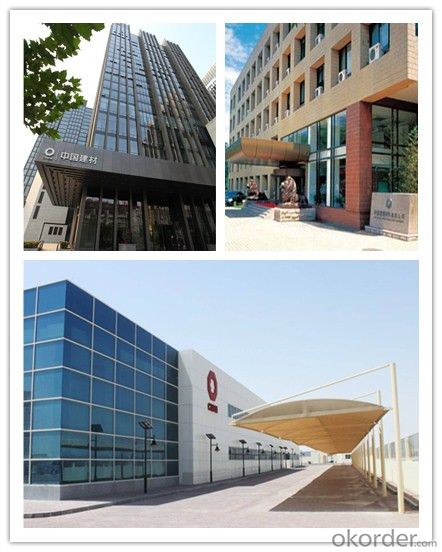
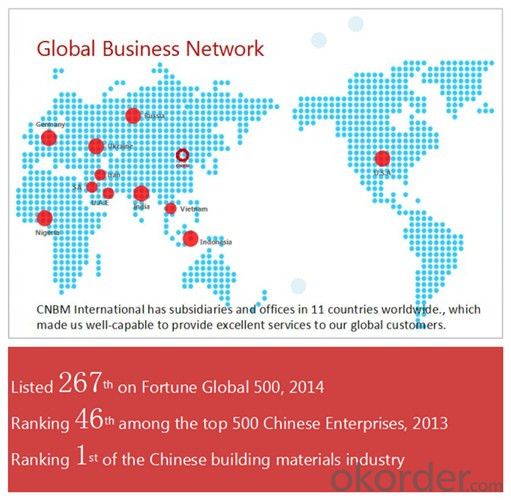
| After-sale service | CNBM provides the services and support you need for every step of our cooperation. We’re the business partners you can trust; you can relax and get on with doing business. |
| For any problem, please kindly contact us at any your convenient time, we’ll reply you in our first priority within 24 hours | |
| Advantages | Industry experience over 20 years. |
| Shipment of goods -More than 70 countries worldwide. | |
| The most convenient transport and prompt delivery. | |
| Competitive price with best service. | |
| High technical production line with top quality products. | |
| High reputation based on best quality products. |
Packaging & Delivery the Hot Rolled High Carbon Wire Rod
| Packaging Detail | Sea worthy packing /as per customer's packing instruction |
| Delivery Detail | 15 ~ 40 days after receiving the deposit |
Products Show
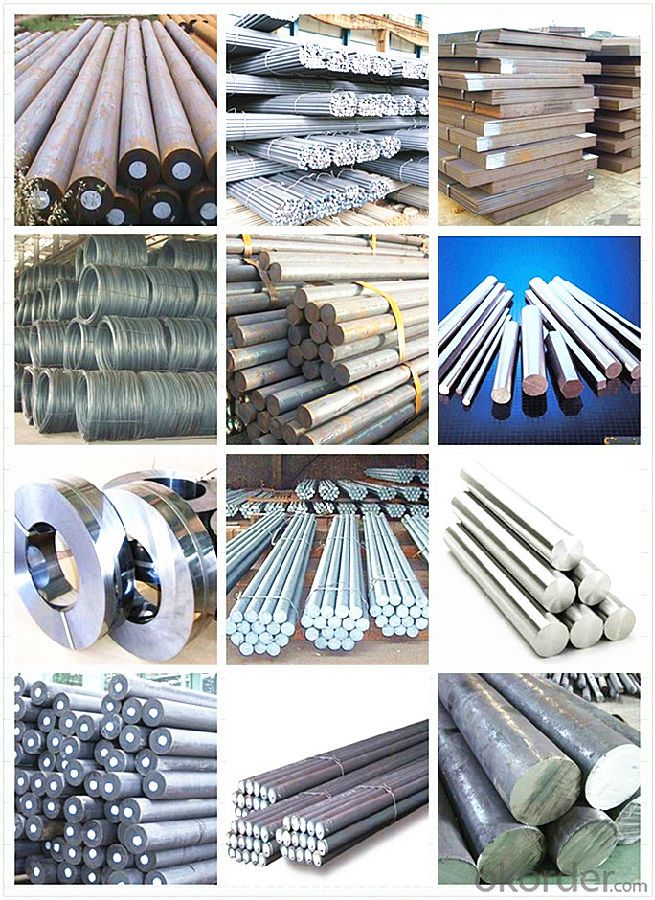
FAQ:
| Are you a trader or manufacturer? | Manufacturer |
| What’s the MOQ? | 3 metric ton |
| What’s your delivery time? | 15-35 days after downpayment received |
| Do you Accept OEM service? | Yes |
| what’s your delivery terms? | FOB/CFR/CIF |
| What's the Payment Terms? | 30% as deposit,70% before shipment by T/T |
| Western Union acceptable for small amount. | |
| L/C acceptable for large amount. | |
| Scrow ,Paybal,Alipay are also ok | |
| Why choose us? | Chose happens because of quality, then price, We can give you both. |
| Additionally, we can also offer professional products inquiry, products knowledge train (for agents), smooth goods delivery, excellent customer solution proposals. | |
| What's your available port of Shipment? | Main Port, China |
| What’s your featured services? | Our service formula: good quality+ good price+ good service=customer's trust |
| Where are your Market? | Covering more than 160 countries in the world |
- Q: How is special steel used in the manufacturing of machinery?
- Special steel is used in the manufacturing of machinery due to its unique properties and characteristics. It provides exceptional strength, durability, and resistance to wear and corrosion, making it suitable for critical components such as gears, shafts, bearings, and cutting tools. Special steel also allows for precise machining and shaping, enabling the production of complex machine parts. Overall, special steel enhances the performance and reliability of machinery, ensuring efficient and long-lasting operation.
- Q: Can special steel be used in high-speed applications?
- Indeed, special steel can be utilized in high-speed applications without a doubt. Special steel encompasses a variety of steel alloys that have been intentionally developed and engineered to possess enhanced properties like exceptional strength, durability, and resistance to wear and corrosion. These properties render special steel appropriate for a wide range of demanding applications, including those involving high speeds. In high-speed applications, such as aerospace, automotive, machining, and power generation, the material must endure extreme conditions, including elevated temperatures, vibrations, and mechanical stress. Special steel is purposefully designed to meet these requirements and deliver outstanding performance even in the face of such challenging circumstances. For instance, high-speed steel (HSS) is a specific type of special steel formulated to retain its hardness and strength at high temperatures, which makes it ideal for cutting tools like drills, end mills, and saw blades. Similarly, stainless steel variants like martensitic and precipitation-hardening stainless steels are frequently employed in high-speed applications due to their exceptional strength, toughness, and resistance to corrosion. Furthermore, the advancement of cutting-edge manufacturing techniques, such as powder metallurgy, has facilitated the production of special steel with even superior properties, including higher hardness, improved wear resistance, and enhanced dimensional stability. These advancements have further expanded the range of applications for special steel in high-speed industries. To summarize, special steel is a versatile and dependable material that can be effectively utilized in high-speed applications. Its unique properties make it suitable for withstanding demanding conditions and delivering excellent performance, which is why it is the preferred choice for industries that require materials capable of enduring high speeds, temperatures, and mechanical stress.
- Q: Can special steel be recycled?
- Yes, special steel can be recycled. Special steel, also known as alloy steel, is a type of steel that contains additional elements such as chromium, nickel, or molybdenum to enhance its properties. These additional elements do not hinder the recyclability of the steel. The recycling process for special steel is similar to that of regular steel. The steel is collected from various sources, such as scrap metal yards, demolition sites, or end-of-life products. It is then processed to remove impurities, sorted, and shredded into smaller pieces. The shredded steel is melted in a furnace to form molten steel, which is then cast into new products or used as raw material for manufacturing processes. Recycling special steel offers several benefits. Firstly, it helps conserve natural resources as it reduces the need for new steel production. Secondly, it reduces energy consumption and greenhouse gas emissions associated with steel manufacturing. Additionally, recycling steel helps decrease waste generation and promotes a circular economy by utilizing existing materials. Overall, special steel, like any other type of steel, can be recycled effectively, contributing to environmental sustainability and resource conservation.
- Q: Can special steel be used in the production of turbine blades?
- Yes, special steel can be used in the production of turbine blades. Special steel is known for its exceptional strength, durability, and resistance to high temperatures and corrosive environments, making it an ideal material for turbine blades which are subjected to extreme conditions in power generation systems.
- Q: What are the advantages of using special steel over other materials?
- Special steel has several advantages over other materials. Firstly, it offers exceptional strength and durability, making it ideal for applications where high performance and reliability are crucial. Additionally, special steel possesses excellent resistance to corrosion, heat, and wear, ensuring longevity and reduced maintenance costs. Moreover, it provides versatility in terms of customization and can be tailored to specific requirements, making it suitable for a wide range of industries and applications. Lastly, special steel offers superior machinability and weldability, facilitating ease of processing and fabrication.
- Q: How does special steel contribute to the dimensional stability of products?
- Special steel is known for its high strength, durability, and resistance to deformation, making it an ideal material for enhancing the dimensional stability of products. By utilizing special steel in the manufacturing process, products are less likely to experience changes in shape or size due to external factors such as temperature fluctuations or mechanical stress. This improved dimensional stability ensures that the products maintain their intended form and functionality over time, leading to increased reliability and customer satisfaction.
- Q: What are the different surface treatments used for special steel?
- There are several different surface treatments that can be used for special steel, depending on the specific requirements and desired properties. Some of the commonly used surface treatments for special steel include: 1. Nitriding: This process involves diffusing nitrogen into the surface of the steel, resulting in a hardened layer. Nitriding improves the surface hardness, wear resistance, and fatigue strength of the steel. 2. Carburizing: Carburizing involves introducing carbon into the surface of the steel, forming a hard and wear-resistant layer. This process enhances the surface hardness and improves the steel's resistance to wear and fatigue. 3. Coating: Coating is a popular surface treatment technique where a thin layer of protective material is applied to the steel surface. Coatings can include various materials like zinc, chrome, or ceramic, which provide corrosion resistance, improved aesthetics, and enhanced durability. 4. Shot peening: Shot peening is a mechanical surface treatment technique that involves bombarding the steel surface with small metallic or ceramic particles. This process induces compressive stresses in the material, enhancing its fatigue strength and resistance to cracking. 5. Electroplating: Electroplating is a process where a thin layer of metal is deposited onto the steel surface using an electrical current. This treatment provides improved corrosion resistance and can also enhance the appearance of the steel. 6. Passivation: Passivation involves treating the steel surface with a chemical solution to remove impurities and create a protective oxide layer. This process improves the corrosion resistance and enhances the surface finish of the steel. 7. Anodizing: Anodizing is a surface treatment commonly used for aluminum but can also be applied to special steel. It involves creating an oxide layer on the steel surface through an electrolytic process. Anodizing improves corrosion resistance, provides an aesthetic finish, and can also be used for coloring the steel. These different surface treatments offer various benefits and are chosen based on the specific application requirements, such as corrosion resistance, wear resistance, hardness, aesthetics, or improved mechanical properties.
- Q: How does special steel contribute to the automotive parts industry?
- Enhanced strength, durability, and performance are crucial attributes that special steel brings to the automotive parts industry. This unique material plays a pivotal role in improving the overall safety, reliability, and efficiency of vehicles. One of the primary benefits of special steel in the automotive parts industry is its ability to withstand extreme conditions, high temperatures, and pressures. This exceptional characteristic makes it perfect for manufacturing vital engine parts like crankshafts, camshafts, and connecting rods, which endure intense mechanical stress and heat. By utilizing special steel, these critical components can withstand the demanding conditions of combustion engines, resulting in enhanced engine performance and longevity. Another significant advantage of special steel is its resistance to corrosion. Automotive parts are exposed to various corrosive elements such as moisture, chemicals, and road salt. With the use of special steel, manufacturers can produce corrosion-resistant parts like exhaust systems, suspension components, and brake rotors, which play a crucial role in maintaining the structural integrity and safety of vehicles over time. Furthermore, special steel offers exceptional formability and weldability, enabling the production of complex automotive parts with precision and ease. This versatility allows manufacturers to create lightweight yet robust components like chassis, body panels, and suspension arms. These components contribute to fuel efficiency, handling, and overall vehicle performance. Additionally, the high tensile strength and toughness of special steel contribute to the safety of vehicles by ensuring the structural integrity of safety-critical parts like steering columns, seat frames, and roll bars. These components play a vital role in protecting occupants during accidents and collisions, making special steel an indispensable material for enhancing overall vehicle safety. In conclusion, the unique properties and characteristics of special steel have a significant impact on the automotive parts industry. Its strength, durability, corrosion resistance, formability, and weldability make it an ideal material for manufacturing critical components in automobiles. By incorporating special steel into various parts, vehicles can achieve improved performance, safety, and reliability while meeting the demands of modern automotive standards.
- Q: What are the applications of special steel in the manufacturing supply chain?
- Special steel has a wide range of applications in the manufacturing supply chain. It is commonly used in the production of machinery, tools, and equipment due to its exceptional strength, durability, and resistance to wear and corrosion. Special steel is also utilized in the automotive and aerospace industries for components that require high performance and reliability. Additionally, it finds use in construction, energy, and defense sectors, among others. Overall, special steel plays a crucial role in enhancing the quality and efficiency of various manufacturing processes and end products.
- Q: What are the different surface hardening methods used for special steel?
- There are several different surface hardening methods that are commonly used for special steel. These methods are employed to improve the hardness and wear resistance of the steel, making it suitable for specific applications. Some of the most commonly used surface hardening methods for special steel include: 1. Carburizing: Carburizing is a heat treatment process that involves introducing carbon into the surface of the steel. This is typically done by heating the steel in a carbon-rich environment, such as a gas or liquid containing carbon. The carbon diffuses into the steel, forming a high-carbon layer on the surface. This process increases the hardness and wear resistance of the steel, making it suitable for applications that require high strength and durability. 2. Nitriding: Nitriding is a surface hardening process that involves introducing nitrogen into the surface of the steel. This is typically done by heating the steel in an atmosphere of ammonia gas. The nitrogen diffuses into the steel, forming a nitride layer on the surface. Nitrided steel exhibits high hardness, improved wear resistance, and increased fatigue strength. This method is commonly used for applications that require high surface hardness, such as gears, bearings, and tools. 3. Induction hardening: Induction hardening is a localized surface hardening method that involves heating only specific areas of the steel using electromagnetic induction. The heated areas are then rapidly quenched, resulting in a hardened surface layer. Induction hardening is often used for components that require high surface hardness, such as shafts, gears, and camshafts. It offers precise control over the hardened area, resulting in improved wear resistance and fatigue strength. 4. Flame hardening: Flame hardening is a surface hardening method that involves heating the steel surface using a high-temperature flame and then rapidly quenching it. The localized heating and quenching process produces a hard surface layer, while the core of the steel remains relatively unchanged. This method is commonly used for large and complex-shaped components, such as axles, crankshafts, and machine tool slides. 5. Laser hardening: Laser hardening is a precise and localized surface hardening method that involves using a high-energy laser beam to heat and melt the surface of the steel. The laser beam is moved across the surface to create a hardened layer. Laser hardening offers precise control over the hardened area, resulting in improved wear resistance and fatigue strength. It is commonly used for small and intricate components, such as cutting tools, molds, and dies. These are just a few of the surface hardening methods commonly used for special steel. Each method offers unique advantages and is chosen based on the specific requirements of the application. By employing these surface hardening methods, special steel can be tailored to meet the demands of various industries, including automotive, aerospace, and manufacturing.
Send your message to us
Hot Rolled High Carbon Wire Rod With Different Material Grades
- Loading Port:
- Tianjin
- Payment Terms:
- TT OR LC
- Min Order Qty:
- 3 m.t.
- Supply Capability:
- 10000 m.t./month
OKorder Service Pledge
Quality Product, Order Online Tracking, Timely Delivery
OKorder Financial Service
Credit Rating, Credit Services, Credit Purchasing
Similar products
Hot products
Hot Searches
Related keywords
